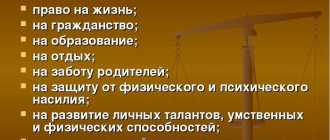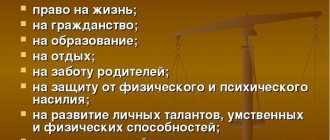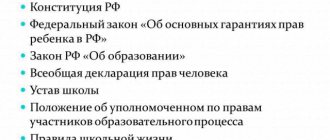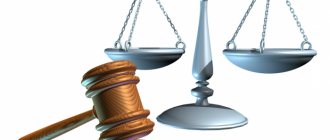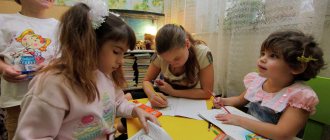From birth, the baby learns to evaluate himself and his life from the point of view of the subjective assessments of an adult living nearby. Any negative manifestation on the part of the parents causes the child to fear the severance of social ties, and leads to the internal conflict “I am society”, laying down a number of complexes, and even causing harm to the child’s psyche. Often negative assessments are accompanied by physical impact, in the form of spanking. Violation of children's rights is much more common than it might seem. And the need to perceive a small member of society as a full-fledged individual is often ignored. Legislation in the field of family and childhood protection is called upon to correct the situation and protect young citizens from encroachments.
Fundamental rights of the child under Russian legislation and international law
A number of legislative acts are intended to consolidate a number of fundamental rights of a minor and regulate the process of their implementation: from the Convention on the Rights of the Child and the Constitution of the Russian Federation to internal regulations of the Commission on Minors' Affairs. The priority of a legislative act at any level should be to respect the interests of minors.
The regulations highlight the following rights of the child:
- to be free from discrimination based on age;
- to life, name and citizenship, family and parental care;
- to information, freedom of thought, opinion and expression;
- to choose and practice religion;
- to the aid and protection of the state;
- for social security and health care;
- for education and recreation.
At the same time, the state is assigned the obligation to protect children's rights. Criminal penalties such as the death penalty and life imprisonment are not applied to minors. Minors have the right to a reduction in the amount of punishment for a crime committed. In cases established by administrative and criminal legislation, adolescents are exempt from liability for committing offenses and crimes due to not reaching the age of responsibility.
In addition, it is prohibited to use humiliating punishments, torture and physical violence against minors. Every minor has the right to protection in the event of armed conflicts.
Right to full name
Having a documented last name, first name and patronymic also applies to the rights of the child. According to the law, his parents choose his name, and his surname corresponds to that of any of them. The child is given a patronymic according to the father's name. Options related to the traditions of different regions are possible.
If the parents fail to reach an agreement on determining the full name of the newborn, the guardianship authorities have the right to become involved in the situation. When the official father is absent, the mother chooses the baby’s name, and she also gives the child her own surname. It is possible to change the child's full name by agreement with the parents after he reaches the age of fourteen.
The concept of violation of children's rights under the civil code
From the point of view of Civil Law, a small citizen, from birth, is a subject of civil legal relations. Due to his minor age, a legal representative acts on his behalf.
The rules of civil law, in particular, are aimed at regulating the process of concluding transactions on behalf of a minor. The function of the Civil Code of the Russian Federation to protect the legal rights and interests of minors is realized in responsibility for causing physical and moral suffering to a child, psychological harm, as well as humiliation of his honor and dignity.
Problems and consequences
At the same time, any father or mother, seeing a violation of the rights and interests of a child in an educational institution (school, kindergarten), will come to his defense. Educators and teachers will be subject to sanctions for any aggressive actions, sometimes even for raising their voice, not to mention attempts at corporal punishment.
Meanwhile, moments of physical violence affect children in the most negative way. Such a violation of the rights of the child is fraught with deterioration in the physical state of health, including the development of serious illnesses. But even worse is the psychological impact, which leads to a distortion of personality and the formation in a growing person of incorrect and unfair ideas about the world around him and the relationships in it.
Such children always have low self-esteem, are withdrawn, feel insecure and enter adulthood completely unprepared to build normal relationships with others. In addition to aggressive behavior, some adults also suffer from other habits - a child is sometimes illegally restricted in his freedom, sometimes his personal belongings are broken and damaged, and as punishment they are deprived of food and even water. There is also a violation of the child’s rights to education in its various forms. And sometimes truly terrible things happen behind the closed doors of apartments and houses.
What child rights are most often violated?
The living environment has a direct bearing on the question of which child rights are violated most often. From birth, the child is surrounded by parents and close relatives. The responsibilities of parents include caring for his mental, physical, spiritual and moral health. However, family education methods passed down from generation to generation often include physical punishment for the slightest offense. It is worth noting that any kind of influence in the form of a slap on the butt or a slap on the head is physical violence, unacceptable for use, even for educational purposes.
In addition to physical violence, psychological violence in the form of shouting, swearing, and insults is often used against a child with a fragile psyche. Parents' refusal to communicate is also a type of psychological violence against a child.
Parents do not take into account that the baby is already an individual person. Leaving the child’s opinion unattended in resolving family issues is a violation of his rights. The result of the impact of such treatment on the child’s psyche is impossible to predict. The child may become embittered, lose trust in others, or become completely withdrawn. Children's health suffers and the child's development is harmed. At the same time, his rights to protection from violence, cruel treatment and abuse by loved ones are maliciously violated.
Difficult relationships in the family, divorce of parents, are often a prerequisite for violation of the rights to communicate with relatives. During the divorce process, a minor often becomes a bargaining chip, a means of psychological pressure on the spouse and an opportunity to obtain larger property. They use bans on communication, hiding the child from relatives, in violation of his legal rights and interests. Although the child has a legally established opportunity to communicate with mom, dad and other relatives.
A parent's refusal to provide maintenance and pay alimony is a direct violation of the property rights of a minor.
A minor, due to his age, naivety and age-related developmental characteristics, is not able to understand the extent of the violation of his rights. Often, being in a dependent position on the offender, the child finds himself in a situation of helplessness, the only way out of which is the intervention of government authorities.
Children's rights in detail
Protecting children is the direct responsibility of every parent. In our country, several legislative documents at different levels are devoted to this topic. The main ones are the Constitution of the Russian Federation and the UN Convention on the Rights of the Child. In addition, there are a number of federal laws and state codes. Regarding the framework of family and social relations, children’s rights are spelled out in most detail on the pages of the Family Code, as well as in Federal Law No. 124 “On the basic guarantees of the rights of the child in the Russian Federation.”
The legislation stipulates that the concept of “child” means a citizen under 18 years of age. And then we will touch in more detail on those rights that are given specifically to minors.
Examples of violations of children's rights
Under the guise of the external well-being of the family, not only the use of unacceptable methods of education, cruel treatment, but even the complete deprivation of children of their livelihood can be hidden.
A striking example of a violation of a child’s rights is a situation where a mother with a drug addiction leaves home for two days, leaving three young children without food and livelihood, thereby putting their lives and health in danger. Another careless mother pours alcohol into the baby’s bottle so that he can sleep while she has guests.
A cruel father, he raises his son with a belt for getting a bad grade in his diary, and then locks him in a room with textbooks, leaving him without lunch.
Infringement of children's rights occurs not only in the family. As a person grows and develops, he acquires wide social connections, including home, school, street friends, neighbors on the street, acquaintances from clubs and sections. The likelihood of rights violations is highest in places of long-term stay.
Adult Responsibilities
The situation prevailing in the family depends entirely on its adult members - the parents. In normal families, it goes without saying that dad and mom are interested in the child’s life, participate in the child’s growing up, and accept his friends. The free time that a parent can devote to his son or daughter is a necessary component of what each of us is obliged to give to our child.
Taking care of the baby as he grows up naturally comes naturally. We are talking not only about normal nutrition, provision of clothing and necessary supplies. The job of parents is to communicate with the baby and participate in solving his problems.
The most important thing is that all fathers and mothers must clearly understand: the presence of any violence (neither physical nor psychological) towards a minor is unacceptable. This is a direct violation of the rights of the child. And therefore, any parent will have to stock up on a considerable amount of patience and clear ideas that it depends on him and only on him how his daughter or son will grow up and how he will enter adulthood.
Violation of children's rights at school
The administration of the educational institution monitors the observance of the rights of schoolchildren. During the learning process, children's rights are most often violated not only by other students in the form of bodily harm, insults, ridicule, but also by those who are called upon to protect against such attacks.
The teaching staff of the school may criticize a student in the presence of the whole class, or make unflattering comments about his mental abilities. Cases of physical violence against minor students by teachers are also not uncommon.
A relic of the Soviet past is the removal of a schoolchild from class, which violates his right to receive an education. If there are service personnel, the school administration may compulsorily assign the student the responsibility of cleaning the classroom or performing other educational activities.
Personal friendly and hostile relationships between teacher and child play a major role in the increase in violations of students’ rights. Freedom of expression and freedom of opinion in the educational process may be suppressed or simply ignored due to the standards of behavior and appearance set by the administration.
Right to be protected
The need for mandatory protection of children's interests is reflected in Article 56 of the RF IC. Speaking about the family circle, it is understood that parents or guardians act as such protectors. It is the duty of absolutely any person who receives information about the infringement of the interests or rights of a child (not to mention a threat to health and life) to notify the relevant authorities. Most often, this is done by teachers, medical staff and everyone else who has constant contact with children due to their occupation.
Minors are also given the opportunity to independently contact the guardianship authorities for the purpose of protection and obtaining the necessary information. Upon reaching the age of 14, a child has the right to file a court application.
Protection of children's rights in Russia
The system for protecting the rights of minors in Russia consists of the following government structures:
- Court. Ensuring the protection of the legitimate interests of minors falls within the competence of the judicial authorities.
- Prosecutor's office. One of the goals of the prosecutor’s office is to analyze and identify facts of violation of children’s rights, including by other government agencies.
- Ministry of Internal Affairs of the Russian Federation represented by juvenile affairs inspectorates. The work of juvenile affairs inspectorates is aimed at identifying and preventing neglect, homelessness, family troubles, as well as cases of child abuse.
- Guardianship and trusteeship authorities. Guardianship and trusteeship protects the rights of minors who find themselves in difficult life situations, victims of domestic violence, and in need of state assistance.
- Commission on Juvenile Affairs. Preventing family troubles and taking public action on cases of violation of children's rights are among the functions of commissions on juvenile affairs.
Legal representatives have the right to appeal to government agencies for restoration of the violated rights of their children. A minor citizen can apply for restoration of his rights independently, especially in cases of unlawful attacks by a legal representative.
The right to live and be raised in a family
Article 54 of the Civil Code of the Russian Federation affirms the right of all minor citizens to live in a family circle with appropriate upbringing. A direct conclusion from this provision: the normal majority of cases include a minor citizen living with his own parents under conditions of guardianship and the necessary care. As an exception, we can consider only cases where the implementation of such a condition leads to a violation of children's interests or creates a threat to the health and life of the child.
In the absence of parents or their deprivation of this status (due to a number of reasons), the minor has the right to live with upbringing either in a special institution or in a foster family. The last option is the priority. An orphanage is considered as a place of residence for a child in the last place - in the absence of alternative solutions.
Responsibility for violation of children's rights
Violation of children's rights involves administrative liability or criminal prosecution. In accordance with the sanction of the article, the perpetrator may face from a warning to imprisonment.
In cases where a violation of the rights of a minor occurs through the fault of an official, in addition to criminal and administrative liability, disciplinary liability may be applied.
If there are grounds, the guilty person may be held liable for moral damages in civil proceedings.
The right to income and material security
The child may have personal income that he has the opportunity to use. He is entitled to the funds necessary for normal life. We are talking about clothing, food, a set of necessary material values, without which normal life, growth and education are impossible.
Article 80 of the RF IC entrusts the maintenance of a child to his parents. If the family has broken up and one of the parents had to pay alimony, it should be spent purposefully to ensure the children’s interests. The same applies to all types of pensions and social benefits, to which children have rights in a number of cases.
According to the law, a minor’s own income includes money and other valuables earned by him independently, inherited or received as a gift. Children's rights extend to family property, but parents cannot legally dispose of their children's belongings. Mutual use of the common property of older and younger family members is possible only by mutual agreement.


